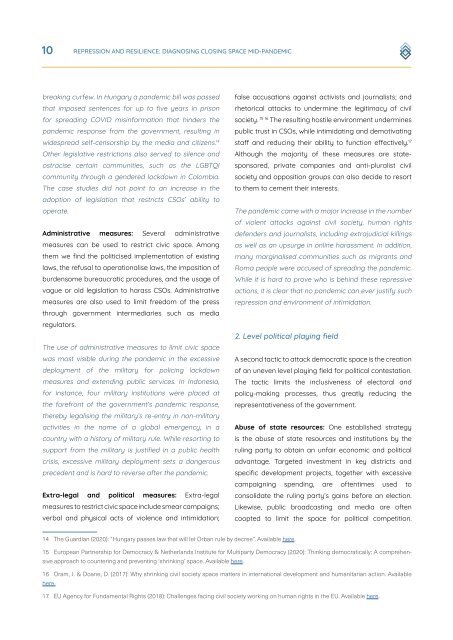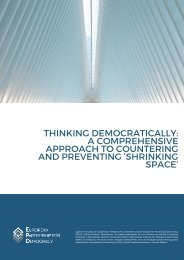Repression and resilience: Diagnosing closing space mid-pandemic
Create successful ePaper yourself
Turn your PDF publications into a flip-book with our unique Google optimized e-Paper software.
10 REPRESSION AND RESILIENCE: DIAGNOSING CLOSING SPACE MID-PANDEMIC<br />
breaking curfew. In Hungary a p<strong>and</strong>emic bill was passed<br />
that imposed sentences for up to five years in prison<br />
for spreading COVID misinformation that hinders the<br />
p<strong>and</strong>emic response from the government, resulting in<br />
widespread self-censorship by the media <strong>and</strong> citizens. 14<br />
Other legislative restrictions also served to silence <strong>and</strong><br />
ostracise certain communities, such as the LGBTQI<br />
community through a gendered lockdown in Colombia.<br />
The case studies did not point to an increase in the<br />
adoption of legislation that restricts CSOs’ ability to<br />
operate.<br />
Administrative measures: Several administrative<br />
measures can be used to restrict civic <strong>space</strong>. Among<br />
them we find the politicised implementation of existing<br />
laws, the refusal to operationalise laws, the imposition of<br />
burdensome bureaucratic procedures, <strong>and</strong> the usage of<br />
vague or old legislation to harass CSOs. Administrative<br />
measures are also used to limit freedom of the press<br />
through government intermediaries such as media<br />
regulators.<br />
The use of administrative measures to limit civic <strong>space</strong><br />
was most visible during the p<strong>and</strong>emic in the excessive<br />
deployment of the military for policing lockdown<br />
measures <strong>and</strong> extending public services. In Indonesia,<br />
for instance, four military institutions were placed at<br />
the forefront of the government’s p<strong>and</strong>emic response,<br />
thereby legalising the military’s re-entry in non-military<br />
activities in the name of a global emergency, in a<br />
country with a history of military rule. While resorting to<br />
support from the military is justified in a public health<br />
crisis, excessive military deployment sets a dangerous<br />
precedent <strong>and</strong> is hard to reverse after the p<strong>and</strong>emic.<br />
Extra-legal <strong>and</strong> political measures: Extra-legal<br />
measures to restrict civic <strong>space</strong> include smear campaigns;<br />
verbal <strong>and</strong> physical acts of violence <strong>and</strong> inti<strong>mid</strong>ation;<br />
false accusations against activists <strong>and</strong> journalists; <strong>and</strong><br />
rhetorical attacks to undermine the legitimacy of civil<br />
society. 15 16 The resulting hostile environment undermines<br />
public trust in CSOs, while inti<strong>mid</strong>ating <strong>and</strong> demotivating<br />
staff <strong>and</strong> reducing their ability to function effectively. 17<br />
Although the majority of these measures are statesponsored,<br />
private companies <strong>and</strong> anti-pluralist civil<br />
society <strong>and</strong> opposition groups can also decide to resort<br />
to them to cement their interests.<br />
The p<strong>and</strong>emic came with a major increase in the number<br />
of violent attacks against civil society, human rights<br />
defenders <strong>and</strong> journalists, including extrajudicial killings<br />
as well as an upsurge in online harassment. In addition,<br />
many marginalised communities such as migrants <strong>and</strong><br />
Roma people were accused of spreading the p<strong>and</strong>emic.<br />
While it is hard to prove who is behind these repressive<br />
actions, it is clear that no p<strong>and</strong>emic can ever justify such<br />
repression <strong>and</strong> environment of inti<strong>mid</strong>ation.<br />
2. Level political playing field<br />
A second tactic to attack democratic <strong>space</strong> is the creation<br />
of an uneven level playing field for political contestation.<br />
The tactic limits the inclusiveness of electoral <strong>and</strong><br />
policy-making processes, thus greatly reducing the<br />
representativeness of the government.<br />
Abuse of state resources: One established strategy<br />
is the abuse of state resources <strong>and</strong> institutions by the<br />
ruling party to obtain an unfair economic <strong>and</strong> political<br />
advantage. Targeted investment in key districts <strong>and</strong><br />
specific development projects, together with excessive<br />
campaigning spending, are oftentimes used to<br />
consolidate the ruling party’s gains before an election.<br />
Likewise, public broadcasting <strong>and</strong> media are often<br />
coopted to limit the <strong>space</strong> for political competition.<br />
14 The Guardian (2020): “Hungary passes law that will let Orban rule by decree”. Available here.<br />
15 European Partnership for Democracy & Netherl<strong>and</strong>s Institute for Multiparty Democracy (2020): Thinking democratically: A comprehensive<br />
approach to countering <strong>and</strong> preventing ‘shrinking’ <strong>space</strong>. Available here.<br />
16 Oram, J. & Doane, D. (2017): Why shrinking civil society <strong>space</strong> matters in international development <strong>and</strong> humanitarian action. Available<br />
here.<br />
17 EU Agency for Fundamental Rights (2018): Challenges facing civil society working on human rights in the EU. Available here.

















